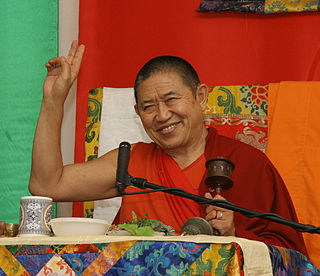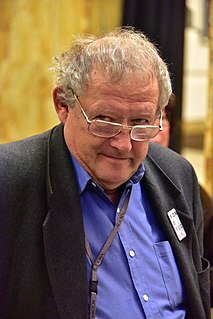A Quote by Russell Simmons
I always say neediness is the cause of suffering. I'm not the only one who says it. It's something I adopted and I believe.
Related Quotes
Bertrand Russell used to employ the method of "evidence against interest"; in other words of deciding that a critique of capital punishment, say, carried more weight if it came from a prison governor. (My friend John O'Sullivan puts it like this: If the pope says he believes in God, he's only doing his job; if he says he doesn't believe in God, he may be on to something.)
The world is full of suffering. Birth is suffering, decre- pitude is suffering, sickness and death are sufferings. To face a man of hatred is suffering, to be separated from a beloved one is suffering, to be vainly struggling to satisfy one's needs is suffering. In fact, life that is not free from desire and passion is always involved with suffering.
My father and I were always on the most distant terms when I was a boy--a sort of armed neutrality, so to speak. At irregular intervals this neutrality was broken, and suffering ensued; but I will be candid enough to say that the breaking and the suffering were always divided up with strict impartiality between us--which is to say, my father did the breaking, and I did the suffering.
I'm always like that about everything. When I try to do something, I always think, "What is the best way to do this?" Instead of taking what everyone else says and how it has been forever, it's faster for me to try myself. Of course I listen to what everybody says, and at first I'll try what people say, but I always come back to trying it my way.
Faith drives a wedge between ethics and suffering. Where certain actions cause no suffering at all, religious dogmatists still maintain that they are evil and worthy of punishment. . . . And yet, where suffering and death are found in abundance their causes are often deemed to be good. . . . This inversion of priorities not only victimizes innocent people and squanders scarce resources; it completely falsifies our ethics.
Whenever we feel that we are definitely right, so much so that we refuse to open up to anything or anybody else, right there we are wrong. It becomes wrong view. When suffering arises, where does it arise from? The cause is wrong view, the fruit of that being suffering. If it was right view it wouldn't cause suffering.
Pain is not the same as suffering. Left to itself, the body discharges pain spontaneously, letting go of it the moment that the underlying cause is healed. Suffering is pain that we hold on to. It comes from the mind’s mysterious instinct to believe that pain is good, or that it cannot be escaped, or that the person deserves it.
Salazar, Ken Salazar, who is a big advocate for the TPP and for fracking. So, you know, since when have we learned to believe what Hillary Clinton says? And just because something has been adopted in the Democratic Party platform, you know, it's a voluntary platform so it has absolutely no traction. This was about trying to buy back the [Bernie] Sanders supporters.




































